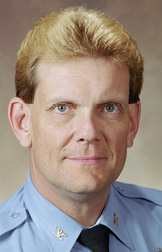
Early on, Ron Miller ’75 made a decision about his career. “I wanted to be a police officer from the time I was nine years old,” he says. This childhood plan became a reality when he joined the Kansas City, Kan., police department in 1973 after graduating from Central Missouri State University.
Miller knew he wanted to eventually become a leader within the department, and he figured that earning a master’s degree would help him reach that goal. At the time, Wichita State had an outreach program in which faculty traveled to the Kansas City area to hold classes. “This allowed me to work in the police department and to work on my master’s,” he says. For his master’s practicum, Miller wrote about collective bargaining as an alternative to police strikes.
He traveled to campus to defend his work in front of criminal justice faculty members, and he also came back to walk in the May 1975 graduation ceremony. “I’m proud to have graduated from Wichita State,” he says.
After 34 years with the KCKPD, including six as police chief, and eight years as chief of the Topeka, Kan., police department, Miller was nominated in 2014 by President Barack Obama to serve as U.S. Marshal for the District of Kansas. The U.S. Senate unanimously confirmed the nomination.
The Marshals Service, founded in 1789, still performs one of its original duties: protecting the federal judicial process, including providing protection for federal judges, court officials, witnesses, jurors, the visiting public and prisoners. The Marshals Service also chases fugitives with felony warrants, keeps tabs on federal sex offenders, helps find missing and exploited children and manages seized assets. “The Marshals Service is involved in virtually every kind of federal investigation,” Miller says.
As the overseer of the Service’s Kansas operations, one of Miller’s priorities is building relationships. “My job as the Marshal, as I see it, is to be part of the management of the district and to work with the judges, the sheriffs, the police chiefs, the state law enforcement folks and other federal agencies to coordinate,” he says. “Because we’re going to handle the property or the arrestee, or we’re going to handle the fugitive that runs, so you need a good relationship.”
Law-abiding Kansans can rest assured that Miller and his team are working diligently to do everything they can to keep the public safe. They work tirelessly because, as Miller puts it: “Somebody has to chase the bad guys.”





